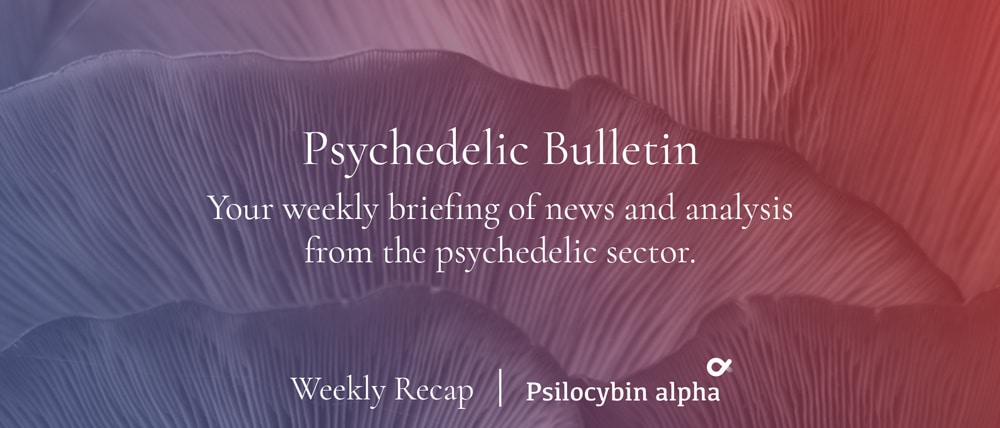Beckley Psytech made headlines this week when they announced the closing of an oversubscribed Series B financing, raising around $80m to advance their low-dose psilocybin and 5-MeO-DMT programs.
Elsewhere, Bright Minds Biosciences reported positive preclinical results, suggesting that their proprietary 5-HT2C agonist may be efficacious in reducing seizure duration and frequency in a rare, drug-resistant form of epilepsy.
In the Weekend Reads segment this week you’ll find a deep dive into the rigour and utility of HaluGen’s Psychedelics Genetic Test kit, plus a recording of a debate that took place at PsyTech’s latest conference on whether the subjective experience is necessary to the apparent therapeutic benefits of psychedelics.
Psychedelic Sector News
Beckley Psytech Raises $80m in Series B
Oxford-based Beckley Psytech has closed an oversubscribed Series B financing raising £58m (c.$80m) to advance their clinical programs.
The company is exploring low-dose psilocybin in the treatment of SUNHA, a rare and debilitating headache condition, and 5-MeO-DMT for undisclosed neuropsychiatric indications. We wrote about the company’s pipeline, with a focus on their psilocybin for SUNHA program, earlier this year.
The round was led by VC firm Integrated, with other investors including Prime Movers Lab, Palo Santo, and Leafy Tunnel.
The financing was covered broadly in popular media, including The Times and The Telegraph.
Bright Minds Claims 5-HT2C Agonist Tackles Seizures in Preclinical Models
Vancouver-based Bright Minds Biosciences provided an update on their proprietary 5-HT2C agonist, BMB-101, this week. According to the company, BMB-101 reduces seizure duration and frequency in pre-clinical models of Dravet Syndrome: a rare, drug-resistant form of epilepsy.
The company claims that the effects are consistent with other anti-epileptics such as fenfluramine. Bright Minds reports that BMB-101 decreased seizure duration by 74% in rodent models, alongside a zebrafish model.
Earlier this year, the company announced that one of its 5-HT2C agonists is effective at reducing binge eating in rodent models. At the time, Bright Minds explained that it appeared to have comparable efficacy to lorcaserin, a 5-HT2C agonist marketed under the name Belviq for weight-loss. Lorcaserin has not been available since the FDA requesting its withdrawal in February 2020 due to post-marketing trials revealing increased occurrences of cancer. The Agency noted, “we believe that the risks of lorcaserin outweigh its benefits based on our completed review.”
Bright Minds is presumably hoping that its proprietary 5-HT2C agonists will demonstrate a similarly efficacious, but far safer, alternative to drugs like lorcaserin and fenfluramine for the treatment of drug-resistant epilepsies, eating disorders, and more.
Other Headlines
- Atai reports Q2 ’21 financial results;
- Cybin files 14th patent application;
- Diamond Therapeutics secures Health Canada approval for low-dose psilocybin trial;
- Field Trip shares Q1 ’22 financial results;
- Filament Health announces Q2 ’21 financial results;
- MindMed joins Critical Path Institute’s Patient-Reported Outcome Consortium;
- Mydecine signs 5-year collaboration agreement with Johns Hopkins;
- PsyBio files U.S. patent application covering methods of producing methylated tryptamines and associated analogs.
Weekend Reading
Psychedelics Genetic Test Called Into Question
Vice’s Shayla Love today published a deep dive into a DNA test that claims to help users “learn how [their] genetics can affect [their] psychedelics response.” The test is marketed by HaluGen, a subsidiary of Entheon Biomedical.
In this article, the validity and utility of the test are interrogated via consultation with researchers in relevant fields. The overall verdict is that the kit is, at best, not particularly useful. At worst, the test “is a potentially dangerous product,” according to Professor Charles Nichols.
Among other fundamental issues, the kit tests for certain genes that, according to Love and the experts she interviews, “have been thoroughly ruled out as candidate genes” for indications such as schizophrenia, bipolar, and psychosis.
“There are people putting millions of dollars into trying to develop these kinds of tests and assays,” Nichols said. “I think this kind of product is really taking advantage, and almost predatory, of people who want this kind of information but don’t understand how complex the question is that they’re trying to answer.”
Video: Can Psychedelics Heal if There’s No Trip?
In this panel, Gul Dolen, David Nichols, and David Olson discuss (read: debate) whether the subjective effects of psychedelics are necessary to their apparent therapeutic benefits.
Weekly Bulletins
Join our newsletter to have our Weekly Bulletin delivered to your inbox every Friday evening. We summarise the week’s most important developments and share our Weekend Reading suggestions.
Live Updates
Join us on Twitter for the latest news and analysis.
Other Channels
You can also find us on LinkedIn, Instragram, and Facebook.


